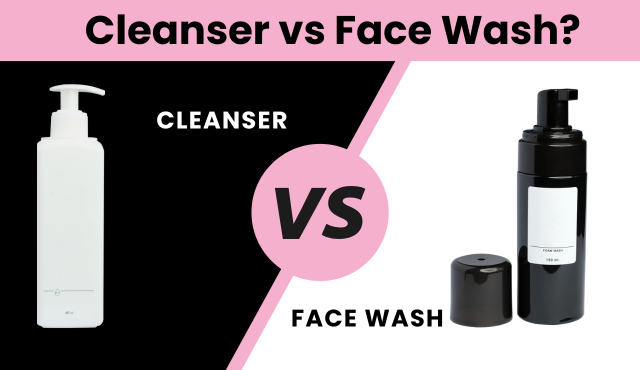
Navigating the world of skincare can be daunting, especially when faced with the choice between a cleanser vs face wash. While they may seem interchangeable, understanding their distinct roles is crucial for achieving optimal skin health.
A cleanser is designed to gently remove makeup, dirt, and impurities while maintaining the skin’s natural moisture balance, making it ideal for daily use.
On the other hand, a face wash typically provides a deeper cleanse, targeting oil and sweat, which is perfect for those with active lifestyles or who spend extended periods outdoors.
This blog will guide you through the key differences between these two essential products and help you make an informed decision on which one best suits your skincare routine. Let’s dive into the nuances of cleansers and face washes to enhance your skincare game.
What is a Cleanser?
A cleanser is a skincare product designed to remove dirt, makeup, and impurities from the skin while maintaining its natural moisture balance. Typically formulated to be gentle, cleansers can come in various forms, such as creams, gels, or micellar waters.
They are ideal for those who want a thorough yet mild cleaning experience that doesn’t strip the skin of its essential oils. Cleansers are often used as the first step in a skincare routine, preparing the skin to absorb other products like serums and moisturizers more effectively. They are suitable for all skin types, including sensitive skin.
What is a Face Wash?
A face wash is a type of cleanser specifically formulated to provide a deeper clean by targeting excess oil, sweat, and impurities. Generally more foaming and effective at removing heavier residues, face washes often contain ingredients like salicylic acid or benzoyl peroxide, which help address issues like acne and clogged pores.
Ideal for those with oily or combination skin, face washes can also be beneficial for individuals with active lifestyles who need a more robust cleansing solution. Used daily or as needed, face washes ensure the skin remains fresh and clear, often as a part of a morning or evening routine.
Key Differences Between Cleanser and Face Wash
Composition and Ingredients:
Cleansers and face washes differ significantly in their formulation. Cleansers often contain moisturizing ingredients like oils and emollients, making them gentler and more hydrating. They are designed to dissolve makeup, dirt, and excess oils. Face washes, on the other hand, typically contain foaming agents and are more water-based, focusing on deeper cleaning by removing impurities and sebum from the skin.
Functionality and Skin Impact:
Cleansers offer a mild, non-irritating approach, ideal for maintaining the skin’s natural moisture barrier. They are suitable for sensitive or dry skin types, ensuring thorough cleansing without stripping away essential oils. Face washes provide a more intense cleanse, often resulting in a fresher, tighter feeling. This makes them effective for oily or acne-prone skin but can be harsh for those with dry or sensitive skin.
Suitability for Skin Types:
Cleansers are perfect for dry, sensitive, or mature skin, providing hydration and a gentle cleanse. Face washes are better suited for oily, combination, or acne-prone skin, offering a more robust cleaning action to manage excess oil and breakouts. Choosing between the two depends on individual skin needs and concerns.
Expert Tips for Choosing the Right Product
Selecting the perfect skincare product can be overwhelming. Here are some expert tips to help you make an informed decision:
1. Assess Your Skin Type: Understanding your skin type is crucial. If you have oily skin, look for products that control excess oil and minimize shine. For dry skin, choose hydrating and moisturizing formulas. Combination skin needs balanced products that address both oily and dry areas, while sensitive skin requires gentle, non-irritating ingredients.
2. Consider Your Skincare Routine: Your existing skincare routine plays a significant role in product selection. If you already use a multi-step routine, ensure the new product complements your current regimen. For instance, a lightweight serum can be a great addition if you use heavy moisturizers. Consistency is key, so select products that integrate seamlessly into your daily routine.
3. Ingredient Awareness: Knowing what ingredients are in your skincare products is essential. Look for active ingredients that target your specific skin concerns, such as salicylic acid for acne or hyaluronic acid for hydration. Avoid harmful chemicals, like parabens and sulfates, which can damage your skin over time. Natural and organic ingredients are often preferable for their gentle and nourishing properties.
4. Personal Preferences: Finally, consider your personal preferences. The texture, scent, and application method of a product can significantly impact your overall satisfaction and consistency in usage. Whether you prefer a gel, cream, or oil-based product, choose one that feels comfortable and enjoyable to use.
By assessing your skin type, considering your skincare routine, being aware of ingredients, and taking personal preferences into account, you can confidently choose the right product for your skin’s needs.
Conclusion:
Choosing between a cleanser and a face wash ultimately depends on your skin type, skincare routine, and personal preferences. Cleansers offer gentle hydration, making them ideal for sensitive or dry skin, while face washes provide a deeper cleanse, suited for oily or acne-prone skin. Understanding the composition and functionality of each can help you make an informed decision.
By following expert tips, you can select the product that best meets your skin’s needs, ensuring a healthy, glowing complexion. At RevieraOverseas Cosmetics Manufacturer, we are committed to helping you find the perfect skincare solutions tailored to your unique requirements.